Rendition
The fool says in his heart, “There is no God.”
They have done horrors of injustice; they are corrupt.
There is not one who builds up and multiplies
The rich goodness God gave the world.
God looks down from the heavenly realm
On the children of humanity
To see whether there are any who are wise,
Who seek after God.
They have all fallen away;
Together they have become corrupt.
There is none who does good,
Not even one.
Do those who fashion evil instead of good know nothing?
They devour my people as they devour bread.
They do not call out to God.
They are in terror where there is none to fear.
They are in flight when none pursue.
God scatters the bones of those
Who set themselves against you.
They are put to shame, for God rejects them.
Who will bring the gift of salvation from Zion?
When God restores the captives,
Let Jacob rejoice. Let Israel be glad.
Notes on the Rendition
Note #1: What does it mean to “make tov”?
In the first chapter of Genesis, God declares his creation “good” over and over again. The word for “good” is tov. Tov means more than the simple English word “good” can contain because it evokes the fullness of God’s goodness—the true goodness behind every good thing.
When God makes humans, he tells them to be fruitful and multiply, spreading the peace and flourishing of the garden throughout his new creation. The tov of Eden was supposed to be contagious. Just as a gardener might expand the order and goodness of a garden plot into the neighboring wild woodland, humanity is supposed to spread the tov that still suffuses creation everywhere we go.
Psalm 53 is saying that no one is actually doing that. Instead, humans have focused their attention on bringing forth, building up, and spreading injustice and corruption. The first line of the psalm ties this abnegation of humanity’s calling to its loss of God: "The fool says in his heart, ‘There is no God.’’’
The best we can manage today is to create pockets where the rampant corruption of the Fall is kept in check and God’s tov is husbanded in the small circles of regeneration the New Testament calls the kingdom of God. The circles of redemption are the beachhead of God’s goodness pressing into his creation gone wild.
Note #2: The Serpent’s Bargain Gone Awry
ESV 53:2—”God looks down from the heavenly realm
On the children of humanity
To see whether there are any who are wise,
Who seek after God.”
There is an irony in verse 2. God is looking down from the heavenly realm to see (raah) if there is anyone who is wise, but finds none. The word for “wise” is sakhal. The first occurrence of sakhal is in Genesis 3 during the Serpent’s temptation of Adam and Eve. Eve, like God in Psalm 53, sees (raah) that the food the Serpent is offering is useful for making one wise (sakhal).
So there is something clever going on in Psalm 53. Long ago, humanity forsook God’s way, turning instead to their own way in pursuit of the Serpent’s bargain: “Go against God and you will become wise (sakhal).” But now, in Psalm 53, God is searching for anyone in whom that dark promise has born fruit and he can find no one. Has the Serpent’s promise made anyone wise? No, not even one. Instead of becoming wise—becoming like God—humanity, like overripe fruit have become corrupt. The Psalm is pointing out that sad reality and lamenting it (and pointing us back to the story that makes sense of it all).
Note #3: Jesus in Psalm 53
In terms of the whole Bible, the line “there is no one who does good, not even one” looks both backward and forward in the Old and New Testaments.
It looks backward to Genesis 18 when Abraham intercedes with the Lord as the angels are on their way to destroy Sodom and Gomorrah. Abraham asks, “Will you sweep away the righteous along with the wicked?” He then proceeds to bargain God down to agreeing to spare the cities if there are 50 righteous found in them, then 45, then 40, then 30, then 20, then 10. And then Abraham stops at 10. Why doesn’t Abraham pursue the question further? What would happen if five righteous were found in the city? What about two? What about one? What would happen if God found no one who does good, not even one?
The New Testament picks up Abrahams question, takes it even further, and answers it with a “yes.”
In Romans 3, Paul quotes this psalm and uses it to say, “No one is righteous, no, not one… all have sinned and fallen short of the glory of God and are justified by his grace as a gift, through the redemption that is in Christ Jesus…”
Will God spare his creation even if no one righteous can be found in it? Yes. Even more, he will be incarnated into it to become that very righteous person himself.
In Christ, the first verse of the psalm is made untrue and the last verse of the psalm is fulfilled.
Oh, that salvation for Israel would come out of Zion!
When God restores the fortunes of his people,
let Jacob rejoice, let Israel be glad.
Become a Paid Subscriber
Any work of sufficient length is only sustained contact with by those who benefit from it. Every new subscription is a message that says: “Keep working. Keep working.”
An idea can be a fragile thing and 150 poems and translations is a big idea. I meant this project to be ambitious though and, if it is ever complete, it will be the work of years.
I know the only way I’m ever going to finish this project is if I know people read, value, and support it. Whether you subscribe or not, if you like a poem or find a rendition of a Psalm helpful, drop me a line or leave a comment and let me know.
Other Links:
Read Three Things, a monthly digest of worthy resources Andy co-edits.
Read Andy’s other newsletter on the Bible and theology, Still Point.
Photo by Artem Kryzhanivskyi on Unsplash

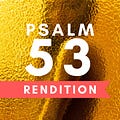





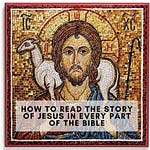

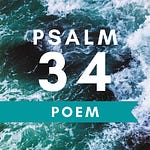



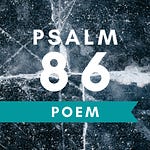
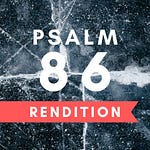
Psalm 53—Rendition